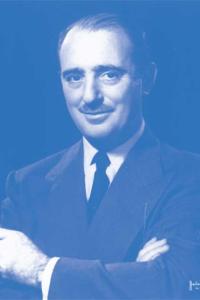A Fitting Tribute
Twenty Years As the Mailman School of Public Health
The Mailman family gave us a name, a brand. Phyllis, Jody, and Josh gave us a sense of community, a banner, the concept that we are a school. That has allowed us to do recruitment, build programs, and coalesce experts in the field of public health who represent a wide range of disciplines. Without a name, you don’t have the same kind of coherence.
W. Ian Lipkin Director, Center for Infection and Immunity John Snow Professor of Epidemiology
When Jody Wolfe, Josh Mailman, and their mother, Phyllis Mailman, pledged $33 million to endow Columbia’s School of Public Health in 1998, it was the largest single gift ever made to a school of public health. For the school, renamed in honor of investor and philanthropist Joseph L. Mailman, and for the family foundation named in his honor, the gift was transformative. “We’d never given this kind of money on our own, for any cause,” says Mrs. Mailman. “It was a coming together of a wish to honor a man who had been beloved in our lives and an opportunity to do something that was truly needed.” The effect of the Mailmans’ investment has been profound, says Dean Linda P. Fried, MD, MPH. “This tremendous gift enabled us to find a space that would become the School’s home, increase financial aid for students, recruit more of the most outstanding faculty, and invest more precious resources in innovative research programs that have yielded countless breakthroughs in public health and prevention.” Joseph L. Mailman had a broad sense of equity and fairness, says his son, which made honoring him through support of public health education and research a particularly fitting tribute. “It’s not just about who can afford the best medical care,” says Josh Mailman.
Twenty-one years ago, we began a search for the best way to commemorate my father’s remarkable spirit of generosity. Happily, our search led to Columbia University’s venerable School of Public Health, then at the threshold of its 75th anniversary. We knew very little about public health at the time, but soon learned the basics—including the hard reality that public health was a desperately underfunded field. We also discovered that the myriad disciplines within public health resonated across our collective generations. It is a great pleasure to celebrate the first twenty years of the Joseph L. Mailman School of Public Health at Columbia University. We look forward to continuing the journey with this exceptional school that teaches how to save lives in the tens of thousands and improve the health of millions in populations around the world.
Jody Wolfe President, The Mailman Foundation
“It’s about having a healthcare system that can cater to all. It speaks to his interest in promoting a fair society.” Graduates share those values, says Mrs. Mailman, who has attended nearly every commencement celebration since 1998. “They really want to go back into their communities and help their constituencies,” she says. “They are thoughtful, earnest people who are looking to give back.” As part of their pledge, and in close consultation with thenDean Allan Rosenfield, MD, the Mailman family determined that the School—previously scattered across 10 city blocks in nooks and crannies of the Columbia University Medical Center—must have not only an endowment and a name, but a physical home. By making their gift contingent on acquisition of a dedicated facility, the Mailman family paved the way for the move to 722 W. 168th St., a 200,000-square-foot facility with sweeping views of the Hudson River. “Small family foundations can do big things,” says Mrs. Mailman. “You don’t have to get in line behind the huge philanthropies. I think that’s really the lesson that should be learned and promulgated. That nice big sign that says ‘The Mailman School of Public Health’ came from a small foundation with a lot of nerve and a lot of will.”
The Mailmans’ generous gift has furnished a welcoming place for Columbia’s public health community to gather. The resulting relationships—among researchers, faculty, school administrators, and students—yield enormous synergies. There are the advantages of hallway and elevator conversations that potentially spark collaborations, which are more difficult when you’re in separate geographic spaces, and the economies of being able to engage in a greater number of events when you can just walk up or down a flight of stairs in the middle of the day.
Michael Sparer Chairman, Department of Health Policy and Management
